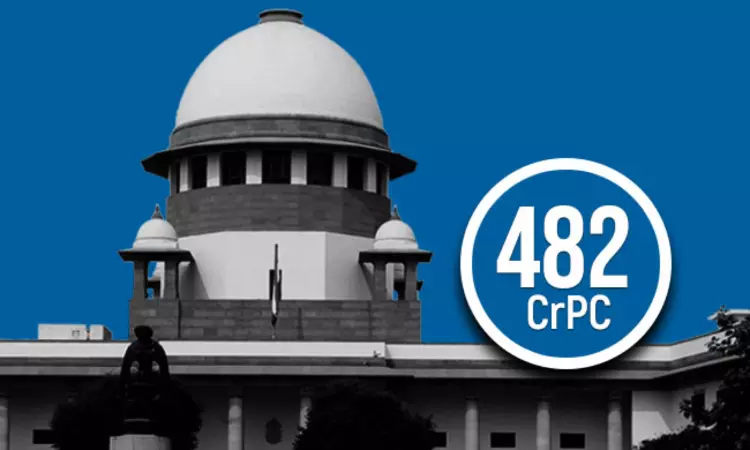The Supreme Court recently observed that there is no absolute rule preventing a High Court from quashing an FIR by exercising its power under Section 482 of CrPC and its equivalent Section 528 of the Bharatiya Nagarik Suraksha Sanhita (BNSS), merely because the investigation is at a nascent stage.
“There is no absolute rule that when the investigation is at a nascent stage, the High Court cannot exercise its jurisdiction to quash an offence by exercising its jurisdiction under Article 226 of the Constitution of India or under Section 482 of the CrPC equivalent to Section 528 of the BNSS.”
If the allegations, taken at face value, do not disclose any prima facie offence, the High Court can intervene to prevent an abuse of the process of law, the Court held.
“When the High Court, in the given case, finds that no offence was made out on the face of it, to prevent abuse of the process of law, it can always interfere even though the investigation is at the nascent stage. It all depends on the facts and circumstances of each case as well as the nature of the offence”, the Court observed.
A bench of Justice Abhay Oka and Justice Ujjal Bhuyan made these observations while quashing an FIR registered by the Gujarat Police against Congress Rajya Sabha MP Imran Pratapgarhi for his Instagram post featuring a video clip with the poem “Ae khoon ke pyase baat suno” in the background.
The case arose from an FIR registered in Jamnagar, Gujarat, against Pratapgarhi under Sections 196, 197, 299, 302, and 57 of the Bharatiya Nyaya Sanhita. Section 196 relates to promoting enmity between different groups on grounds of religion, race, place of birth, residence, language, or similar grounds, and committing acts prejudicial to the maintenance of harmony.
The Supreme Court observed that mens rea must be read into Section 196 of the BNS. In the present case, the Court concluded that it was impossible to attribute any criminal intent to Pratapgarhi.
The Supreme Court observed that the registration of the FIR appeared to be a “mechanical exercise” and amounted to a clear abuse of the process of law. It remarked that the act of filing such an FIR “virtually borders on perversity”, and criticized the High Court for not intervening.
“In the instant case, as we have seen, no prima facie case can be said to have been made out against the appellant qua the sections invoked. In such a case, registration of the FIR appears to be a very mechanical exercise and is a clear abuse of the process of law. In fact, registration of such FIR virtually borders on perversity. We are surprised that this very crucial aspect escaped the notice of the High Court. The High Court ought to have nipped the mischief at the threshold itself.”
The High Court had relied on the judgment in Neeharika Infrastructure Pvt. Ltd. v. State of Maharashtra, in which the Supreme Court observed than when the High Court exercises power under Section 482 CrPC, it only has to consider whether the allegations in the FIR disclose a cognizable offence or not. Further, it is not required to consider whether on merits the allegations make out a cognizable offence and has to permit the investigating agency to investigate the allegations in the FIR.
However, in the present case, the Supreme Court held that there is no blanket restriction on the High Court’s powers to intervene at a nascent stage of investigation.
“There is no such blanket rule putting an embargo on the powers of the High Court to quash FIR only on the ground that the investigation was at a nascent stage. If such embargo is taken as an absolute rule, it will substantially curtail the powers of the High Court which have been laid down and recognised by this Court in the case of State of Haryana v. Bhajan Lal”, the Court held.
The High Court had concluded that the poem’s “tenor” and the responses to the post could disturb social harmony. It remarked that Pratapgarhi, as a Member of Parliament, was expected to behave with greater restraint.
The Supreme Court stated that it failed to understand how the High Court reached its conclusion that the post would disturb social harmony, and noted that the High Court was aware that the case involved Pratapgarhi’s right to freedom of speech and expression guaranteed under Article 19(1)(a) of the Constitution.
The Supreme Court cited the judgment in State of Haryana v. Bhajan Lal which outlined categories of cases in which FIR may be quashed, including:
- The allegations in the FIR, even if accepted as true, do not prima facie constitute an offence or make out a case against the accused.
- The allegations and accompanying materials do not disclose a cognizable offence, thus not justifying an investigation by the police.
- The allegations and evidence do not disclose the commission of any offence.
- The allegations constitute a non-cognizable offence and no investigation can be conducted by the police without a Magistrate’s order.
- The allegations in the FIR are so absurd or inherently improbable that no reasonable person would conclude that there is sufficient ground to proceed with the case.
- There is an express legal bar preventing the institution or continuation of the proceedings.
- The criminal proceedings are motivated by mala fide intentions or are maliciously instituted for personal reasons, such as revenge.
Concluding that the no prima facie case was made out against Pratapgarhi, the Supreme Court quashed the FIR and set aside the Gujarat High Court’s judgment.
Other reports about the judgment can be read here.
Case no. – Crl.A. No. 1545/2025
Case Title – Imran Pratapgadhi v. State of Gujarat
Citation : 2025 LiveLaw (SC) 362





